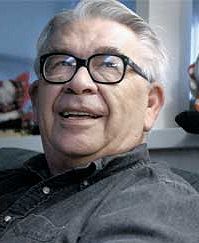POSTED BY Colorado AIM
In Honor of Vine Deloria, Jr. (1933-2005)
The great indigenous visionary, philosopher, author and activist
Vine Deloria, Jr. passed over to join his ancestors on November
13, 2005.
Vine Victor Deloria Jr. was born in 1933 in Martin, South Dakota. He obtained a Master of Theology degree from the Lutheran School of Theology in Rock Island, Illinois in 1963 and a J.D. from the University of Colorado in 1970. He was one of the most outspoken figures in Native American Affairs. His works promote Native American cultural nationalism and a greater understanding of Native American history and philosophy.
Our thoughts and prayers go to his wife, Barbara, to his
children and his other relatives. The passing of Vine creates a huge
intellectual and analytical void in the native and non-native
worlds. He will be greatly missed.
It is appropriate to reflect on the meaning of
Vine’s contibutions to indigenous peoples’ resistance, and to
reflect on our responsibilities to maintain and to advance the
lessons that Vine gave to us.
 |
| Vine Deloria, Jr. |
It is safe to say that without the
example provided by the writing and the thinking of Vine Deloria,
Jr., there likely would have been no American Indian Movement, there
would be no international indigenous peoples’ movement as it exists
today, and there would be little hope for the future of indigenous
peoples in the Americas.
Vine Deloria, Jr. was a true revolutionary when he wrote “Custer
Died for Your Sins” in 1969, the first of his scores of books and
scholarly articles.
Just a partial list of Vine Deloria Jr.’s important books includes:
Aggressions of civilization : federal Indian policy since the 1880s
American Indian policy in the twentieth century
American Indians, American justice
Behind the Trail of Broken Treaties : an Indian declaration of independence
A brief history of the Federal responsibility to the American Indian
Brave Are My People : Indian Heroes Not Forgotten
Crazy Horse: The Strange Man Of The Oglalas
Custer died for your sins : an Indian manifesto
Evolution, Creationism, and Other Modern Myths: A Critical Inquiry
For this land : writings on religion in America
God is red : a native view of religion
Heart of the Rock: The Indian Invasion of Alcatraz
The Indian Reorganization Act: Congresses and Bills
Indians of the Pacific Northwest: From the Coming of the White Man to the Present Day
The metaphysics of modern existence
The Nations Within : The Past and Future of American Indian Sovereignty
Not Without Our Consent: Lakota Resistance to Termination, 1950-59
Power and Place: Indian Education in America
Red earth, white lies : Native Americans and the myth of scientific fact
A sender of words : essays in memory of John G. Neihardt
Singing for a Spirit: a portrait of the Dakota Sioux
Spirit & Reason: The Vine Deloria, Jr., Reader
Tribes, Treaties, and Constitutional Tribulations
We Talk, You Listen: new tribes, new turf
The World We Used to Live in: Remembering the Powers of the Medicine Men
He also recorded the Reminiscences of Vine V. Deloria, Yankton Sioux Tribe of South Dakota, an Oral History given to the New York Times oral history program,
American Indian oral history research project. Part II ; no. 82.
Vine Deloria, Jr won the Wordcraft Circle Writer of the Year (Prose – Personal and Critical Essays) award in 1999 for Spirit and Reason.
He had the courage and the vision to challenge the dominating society at its core. He
was unapologetic in confronting the racism of U.S.law and policy,
and he was prophetic in challenging young indigenous activists to
hone their strategies.
We will write much more about Vine in the upcoming days. He was our
elder statesman and mentor. For now, we will share this passage
from “Custer Died For Your Sins,” as a reminder of our
responsibilities, and to ensure that we are more deliberate and
strategic in our resistance.
“Ideological leverage is always superior to violence….The problems
of Indians have always been ideological rather than social,
political or economic….It is vitally important that the Indian
people pick the intellectual arena as the one in which to wage war.
Past events have shown that the Indian people have always been
fooled by the intentions of the white man. Always we have discussed
irrelevant issues while he has taken our land. Never have we taken
the time to examine the premises upon which he operates so that we
could manipulate him as he has us.”— “Custer Died for Your Sins: An Indian Manifesto,” (1969) pp.251-
252
and this relevent passage regarding the example of the great Oglala
Lakota leader Tashunka Witko (Crazy Horse):
“Crazy Horse never drafted anyone to follow him. People recognized
that what Crazy Horse did was for the best and was for the people.
Crazy Horse never had his name on the stationery. He never had
business cards. He never received a per diem. *** Until we can once
again produce people like Crazy Horse all the money and help in the
world will not save us. It is up to us to write the [next] chapter
of the American Indian upon this continent.”page 272
For many of us, Vine was a contemporary Crazy Horse. Perhaps we
squandered his time with us. We took him for granted, and assumed
that he would always be with us. Now, the question is, not only will
we produce more Crazy Horses, but will we produce more Vine Deloria,
Jr.s?
Vine, we will miss you, but we will continue your work toward freedom for native peoples everywhere.
Mitakuye Oyasin.
Colorado AIM